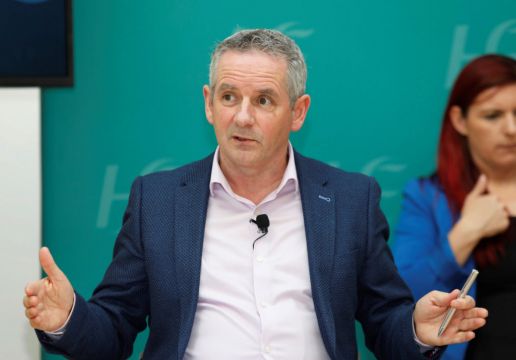The director general of the HSE, Paul Reid, has said that the recent rise on Covid numbers was “not a panic button”, but a signal of early warning.
The vaccination programme was protecting people from illness, hospitalisation and fatality, he told RTÉ radio’s Today with Claire Byrne show. However, there was evidence that the number of unvaccinated people was having a disproportionate impact.
While “just 8 per cent” of the population remained unvaccinated, 67 per cent of those in ICU were unvaccinated, he said.
The unvaccinated were 17 times more likely to be hospitalised if they contracted the virus, he said.
This is a very early warning for us all.
Advertisement
The return to office work and more socialising were all a factor. “This is a very early warning for us all.”
When asked about a booster campaign, Mr Reid said that the HSE was ready and willing to complete such a campaign, but were awaiting advice from the National Immunisation Advisory Committee (Niac).
The HSE was anxious to go ahead with the booster campaign for the wider community and for its own workers.
“We are mobilised and ready. We are ready to go, from our perspective, the sooner the better”.
But in the meantime there was a need to encourage people who were not yet vaccinated to do so, including the 70,000 who had not taken their second dose.
The HSE had the infrastructure and the workforce and could roll out the booster campaign when instructed by Government, he said.
Emergency departments
Mr Reid acknowledged that the hospital system was under pressure with the numbers presenting to emergency departments 20 per cent above pre Covid levels.
“This is going to be a very challenging winter”. Private hospitals would be part of the solution, he said.
When asked about delays in scoliosis surgery, Mr Reid said that the reality was that Covid and the cyberattack had impacted all hospital systems. Consultants could not operate after the cyberattack because they did not have access to patient records.
“We are extremely sorry for what has happened”.
Waiting lists

There was no doubt that waiting lists were a systemic problem and a legacy issue, but waiting lists were going to be tackled as part of a funded action plan in a multi annual approach.
Significant levels of reform had come about during Covid, but he said he understood there was frustration, shared by all, at the pace of Sláintecare reform.
“I’ve never seen so much change, by so many in such a short time.”
The HSE was playing catch up, but there had been significant enhanced investment. He wanted public hospitals to be focused on public care, but the private system would be part of enhanced services.







